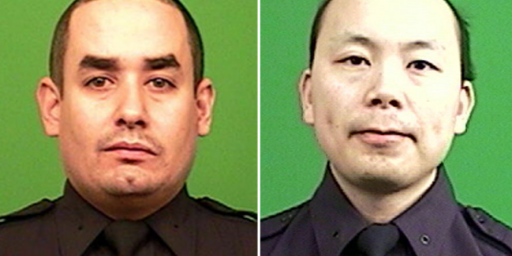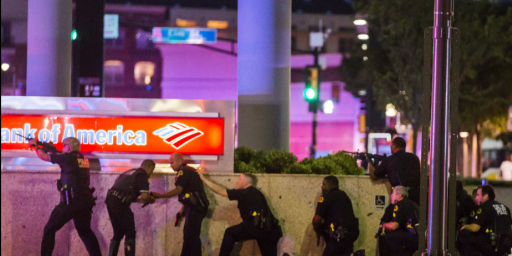Louisiana Police Officers Charged With Murder In Death Of Six Year Old During Chase
Thanks apparently in part to body camera footage, two police officers in Louisiana are facing murder charges in the shooting death of a child during a police chase.
Two police officers in Louisiana have been charged with murder in the shooting death of a six year-old boy killed after a high-speech pursuit:
Two police officers have been arrested on charges of second-degree murder in connection with the shooting death of a 6-year-old boy during a pursuit of his father in a sport utility vehicle in central Louisiana, the state police said Friday.
The officers, Norris Greenhouse Jr. and Lt. Derrick Stafford, who were placed on administrative leave after the chase on Tuesday, also face charges of attempted second-degree murder, Col. Michael Edmonson, superintendent of the Louisiana State Police, said during a news conference on Friday.
The father, Chris Few, who was driving, was critically injured in the shooting. Mr. Few’s son, Jeremy Mardis, was killed after the police opened fire on the S.U.V.
The coroner said the boy was struck several times in the head and chest. An autopsy was performed on Wednesday, but a final report was not expected to be ready for eight weeks.
“He didn’t deserve to die like that and that’s what’s important,” Colonel Edmonson said Friday. “That little boy was buckled in the front seat of that vehicle and that was how he died.”
Colonel Edmonson said that over the past 72 hours, investigators had studied footage from body cameras, interviewed witnesses and listened to 911 recordings. He promised a “methodical and detail oriented investigation.”
He declined to say why the police began pursuing Mr. Few’s vehicle, or what caused them to open fire.
Describing the body camera footage, Colonel Edmonson said, “I can tell you as a father it was one of the most disturbing things I have witnessed.”
Two other police officers were involved in the chase, in addition to Officer Greenhouse and Lieutenant Stafford, the superintendent said, but he declined to say whether either of the other officers was suspected of wrongdoing.
He said investigators would follow the case “wherever this takes us” and that the state police had seized guns from all officers present during the shooting.
All four are officers with the Marksville, La., police who work part time as city marshals.
The report form The New Orleans Times-Picayune doesn’t provide much more detail about the events that led up to Jeremy Mardis’s death or the reasoning behind the decision to pursue murder charges this quickly, but one must assume from the speed with which it occurred that the evidence must be fairly strong in the opinion of police and prosecutors. We don’t know, for example, what it was that set off the chase to begin with, or what possible justification the police would have had for shooting at a moving vehicle as apparently happened in this case. Ordinarily, the law only permits officers to use deadly force in a pursuit when there is a felony involved or there is a reasonable belief that the person they are pursuing is a threat to the safety of others. Using gunshots to attempt to stop a guy over a traffic infraction, for example, would generally not be an acceptable use of force. Specifically, the Supreme Court has most recently ruled, in Tennessee v. Garner, that deadly force against a fleeing suspect is only permissible when the suspect poses “a threat of serious harm, either to the officer or to others.” Additionally, depending on the facts of the case, the presence of a child or other passenger in the vehicle could place further limits on the legal acceptability of the use of deadly force.
What’s notable, of course, is the fact that at least some of the evidence being considered here apparently comes from the body and dashboard cameras of the officers that were involved in the chase and the shooting. Ever since the Michael Brown shooting in Ferguson, Missouri, there has been a growing call for police departments to begin using body cameras, and expand use of dashboard cameras, in an effort to get a record of police encounters between police and members of the public that is more reliable than just witness statements that can often be flawed or the one-sided self-serving testimony of the officers involved in a particular incident. While there are obvious issues regarding privacy that use of these cameras raise, especially in cases involving sexual assault, domestic violence, and incidents involving juveniles, it seems fairly clear that this is a good idea, and the fact that such evidence apparently forms at least part of the basis for this case would seem to provide further evidence in favor of expanding their use. In the long run, perhaps, using this type of technology could help to alter police behavior in ways that makes situations like the death of Freddie Gray in Baltimore, Walter Scott in North Charleston, South Carolina, Samuel DuBose in Cincinnati, Ohio less likely. Even if that doesn’t happen, though, the cameras would help ensure that law enforcement, prosecutors, and the public have a record to consult to get at least somewhat of an objective recounting of what happened in a particular incident.
As always, of course, the officers charged in this case are entitled to the same presumptions of innocence as any other criminal defendants, and I’m not going to jump to any conclusions about the case based on the limited public record available. That being said, it’s at least good to see police being held accountable for behavior that, in the past, they would have gotten away with without even being seriously questioned. It needs to happen more ofte in.







Wasn’t all that long ago when the father would have been charged with the murder of his son as a matter of course. It is a welcome development.
No, that’s inaccurate. It’s only “when there is a felony involved AND there is a reasonable belief that the person they are pursuing is an IMMEDIATE threat to the safety of others.” It’s basically if you don’t stop this person with deadly force, he’s going to right away go out and hurt someone. Merely fleeing after alleged commission of a felony is not justification for officers to use deadly force in pursuit.
About 30 years ago a friend of mine who was on the Portland, Oregon police department that about 30% of the officers were psychologically unfit to be police officers. In Oregon all certified police officers must go through the State Police academy. A little over 10 years ago the Academy instituted several days of psychological testing at the beginning and guess what ? About 30% were given the boot after that testing.
@Ron Beasley:
That 30% is hard to fix when the 70% form a blue wall of silence and protect them. That’s the culture that needs to change. Cops see this as a team sport, us vs. them. But they are not hired to protect each other, they are hired to defend and enforce the law. Only the law.
Some of the blame for that goes to the media, particularly TV shows in which showrunners grab for the easy thing – the beat down, the threats of prison rape, bogus scenes of bad guys walking on a technicality – rather than place police work in a realistic, law-focused storyline. They’ve glamorized the blue thugs and made the real cops look like impotent wimps.
I wouldn’t hold out much hope that the charges will stick. Here in Pennsylvania, they just acquitted an officer who shot an unarmed tased man in the snow. They decided that him being unable to “show his hands” to the panicky trigger-happy cop (because he was being, you know, tased) justified shooting him twice in the back.
Ta-Nehisi put it well a few weeks ago in the context of Tamir Rice. The Courts have established a legal standard that cops can only be judged by what they are thinking in that precise moment. Everything leading up to that moment or following is irrelevant. So if you roar up to a 12 y/o in your car and jump out, all the jury should consider is whether you could have thought his toy gun was real. As TNC put, this requires an act of telepathy from the jury.
(Needless to say, citizens are not given this benefit of a doubt. If the police break down your door in the middle of the night and you shoot at them because, in the confusion, you think you’re being robbed, you’re a murderer.)
@Hal_10000: I think we’re really in the midst of a massive change in our culture where we won’t tolerate this any longer. Cell phones with cameras everywhere have exposed enough abuses that cannot be ignored, so we are moving towards mandatory dash cams and body cams, which will expose more.
The laws will follow slowly, and the juries a bit slower still. But it will happen.
I doubt that police will ever face the same consequences for their actions as common people, but things will get less worse. The cop in the Pennsylvania case above — in all likelihood they’re going to have a hard time sweeping this under the rug and finding their next job. And that protects the community at large. 5 years ago, we wouldn’t have even had that. 5 years from now, maybe we will be getting regular convictions on negligent homicide.
(And I’m not sure I would want to go further than negligent homicide in most of these cases — often the officers haven’t been given the right training, and are making bad decisions in stressful situations because they haven’t haven’t had the right decisions drilled into them)
@Gustopher:
Um, I haven’t had the right training, and I’m also often making bad decisions in stressful situations. Does that mean I also get one free murder just like cops do?
@Ron Beasley: Only 30%? Based on what I’ve read periodically in the Oregonian, I would have guessed a LOT higher.
@Hal_10000: @Gustopher: I’m not as hopeful as Gustopher is. I was listening to a local afternoon radio talk show from Portland, OR, where the hosts and most of the callers seemed to agree that people “deserve whatever happens to them” in encounters with the police under the following circumstances:
1. disagreeing with the officer
2. talking back to the officer
3. questioning what the officer said to the person
4. using “that tone” (whatever that means)
5. objecting to what the officer has accused you of
I turned off the show after that and contemplated the possibility that the hosts of the show were secretly advocating that I should get a gun and a carry permit. Then I remembered what 1967-about 1972 were like in Seattle where I grew up and tried to go to my happy place instead.
And one of the officers had the rank Lieutenant. One would have hoped that an officer of that rank would have the experience and demeanor necessary to have exerted better control over the situation. In case you can’t guess, I’m having some trouble making any kind of sense about this event.
I’m sadly having a hard time thinking that the quick decision to prosecute in central Louisiana isn’t related to the race of the victim.
@Grewgills:
Or the race of the police officers.
@PJ:
The race of the child that was killed. Maybe I’m just cynical and this is the start of a new trend. Two drinks in to a Saturday night I’m hopeful.
this really sucks, i’m sure he father shares a lot of the blame for putting his child in that situation but we can’t talk about that- odds are that he had a warrant for unpaid traffic stuff at a minimum.
this won’t get much media play as the 2 cops are black and there’s no video available for us to see.
the sad state of affairs in this country- i wonder if the blm crowd will chime in, but doubt it as it’s ok when blacks kill each other.
@bill:
Why can’t we talk about that? Be specific.
Well, now they’ve gone and screwed us all. Sure, some little kid was killed, but don’t you realize if these cops are criticized for their actions every police officer in the country will refuse to investigate or stop crimes because their feelings are hurt? Is some kid’s life worth wounding the delicate sensibility of our men in blue? The head of the FBI says no — and if we disagree, then even more feelings will be hurt.
@Just ‘nutha ig’rant cracker:
People should be respectful to police. People should be respectful to everyone. Some of the people in these videos do, in fact, act like jerks. But the punishment for being a jerk should not be execution.
@bill: I’m not seeing your point…is it that the reasonable reaction of police to unpaid traffic warrants is shoot the car to doll rags?
@Just ‘nutha ig’rant cracker
I’m pretty sure his point is more along the lines of “Well, if the father weren’t such a thug, this never would have happened” since he can’t actually smear the kid with that particular racist dogwhistle.
And his “but we can’t talk about that” is a preemptive attempt to pretend he’s not saying racist things, as in “we can’t talk about what a thug the father probably is because the regulars here will jump all over me with accusations of racism for saying it, and despite the fact that the only thing I know about him is that he is black, my immediately painting him as a thug isn’t racist at all!”
Marksville La is listed as having a population of 5,700. One of the things I think needs to change is every two bit jurisdiction having it’s own police force, too small and ill funded to possibly maintain standards of training and professionalism.
@Ken in NJ:
The kid appears to be white, so while Bill isn’t above racist dog whistles this isn’t such an occasion.
@Grewgills:
Well, that’s what I get for speaking without knowing the details.
So, my apologies to Bill for unfairly maligning him in this instance. While I stand by the general sentiment of my comment, it’s clear I was wrong on some important details, in my haste to comment, jumped to the wrong conclusions on this particular issue